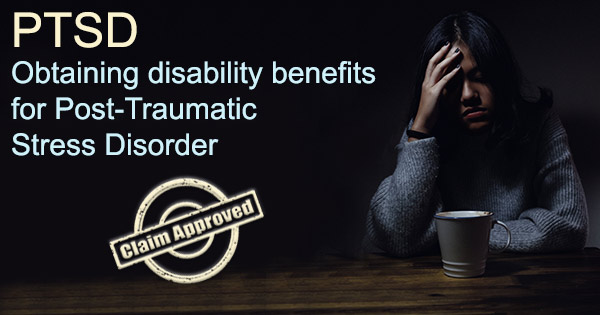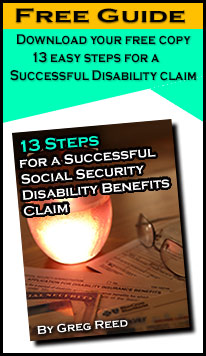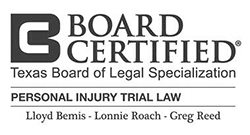Post-Traumatic Stress Disorder and qualifying for disability assistance.
Can I get disability benefits if I am suffering from the effects of Post Traumatic Stress Disorder, or PTSD?
Author: Attorney Greg Reed
Updated: 8/14/2023
Post Traumatic Stress Disorder, or PTSD, is a disorder that develops when a person experiences a frightening, shocking, or dangerous event. According to the American Psychiatric Association, approximately 3.5% of Americans suffer from PTSD in any given year. Women are more likely than men to experience PTSD and veterans and first responders are at higher risk. If you are suffering from the effects of PTSD you may qualify for disability benefits.

If you are suffering from the effects of PTSD and have been denied disability don’t give up, almost 70% are denied initially! Just call 512-454-4000 for a free, no obligation consultation to learn what your options are.
Even though people often associate PTSD with military experience such as war, anyone can suffer from PTSD.
It can be triggered by a serious accident, violent assault, a natural disaster, or even the loss of a loved one. It is normal for a person to be frightened during and after a traumatic event, and most people recover over time, but individuals afflicted with PTSD continue to experience a feeling of danger long after the event has passed.
The symptoms of PTSD can be separated into four categories:
- Reliving or re-experience.
- Avoidance.
- Increased arousal.
- Cognitive and mood.
The individual relives the traumatic event through flashbacks, nightmares and hallucinations. Events or locations may remind them of the traumatic event or a person’s own thoughts or feelings may trigger symptoms.
The person avoids situations, places and people who remind them of the event. A person may change their daily routine or keep themselves isolated from family, friends and colleagues. They may also lose interest in activities they once enjoyed.
These symptoms may include being irritable and having angry outbursts, behaving recklessly or in a self-destructive way, being overly watchful and suspicious of one’s surroundings; being easily startled; or having problems concentrating or sleeping. Physical symptoms include rapid breathing, muscle tension, nausea and diarrhea.
The person may have trouble remembering key details of the event or have ongoing and distorted beliefs concerning the event, themselves, and others. They may also experience feelings of guilt, blame, estrangement and shame.
The symptoms of PTSD may continue for years, interfering with a person’s daily life and possibly result in depression, substance abuse, and memory problems.
These or a combination of these symptoms can cause you to miss work and jeopardize your ability to maintain employment.
Treatment for PTSD includes medications and psychotherapy.
Medications such as Paxil, Zoloft and Elavil can control feelings of anxiety while other medications may be prescribed for nightmares. Psychotherapy can help a person develop skills to manage their symptoms and cope in daily life.
Demonstrating that you are following your doctor’s treatment plan is an important part of qualifying for disability benefits.
Qualifying for Disability (SSDI) for Post Traumatic Stress Disorder, or PTSD
The Social Security Administration acknowledges that the symptoms of PTSD, such as recurring flashbacks and nightmares, can disrupt a person’s daily routine and prevent them from working.
Social Security has created a manual called the Blue Book which lists impairments Social Security considers disabling and may automatically qualify for benefits; PTSD is specifically listed under Section 12.15 Trauma and stressor-related disorders. To qualify for disability benefits under this listing, you must present medical evidence of ALL of the following:
- Exposure to actual or threatened death, serious injury, or violence;
- Involuntary re-experiencing the traumatic event; for example, dreams, memories, or flashbacks;
- Avoidance of external reminders of the event;
- Disturbance in mood and behavior, and
- Increased arousal and reactivity, such as sleep disturbances or startled responses.
If you are suffering from PTSD and have been denied disability don’t give up, almost 70% are denied initially! Just call 512-454-4000 for a free, no obligation consultation to learn what your options are. Have some questions? just give us a call, we love to help folks just like you!
You must also show “extreme” limitation of one, or “marked” limitation of two of the following areas of mental functioning.
“Extreme” means debilitating and “marked” means intense, but not debilitating.
- Understanding, remembering, or using information; for example, learning new tasks;
- Being able to interact with others in a socially acceptable manner;
- Being able to focus on tasks and complete them in a reasonable time;
- Adapting and managing oneself; i.e., controlling emotions, adapting to change, and managing daily tasks such as paying bills, shopping, or cooking.
Because “extreme” and “marked” are subjective, it can be difficult to provide evidence of mental limitations.
Social Security recognizes that some applicants who suffer from PTSD only function well because they have a strong support system. So, in addition to reviewing your medical records, Social Security will look for evidence to support your claim from your family, friends, social workers and group homes.
Social Security will want to see that you have a medically documented history of PTSD over a period of at least 2 years, and evidence of both of the following:
- Medical treatment, mental health therapy, psychosocial support, or living in a highly structured setting that is ongoing and that diminishes the symptoms and signs of your mental disorder; AND
- You have minimal capacity to adapt to changes in your environment or to demands that are not already part of your daily life.
In any case, you will be expected to provide complete medical evidence to support your claim, including:
- Your medical records;
- Reports from any hospital stays;
- Clinic notes from all of your healthcare providers, including doctors, psychiatrists, counselors, and social workers;
- Medications you are taking and your response; and
- Treatment plans you are following.
Social Security gives a lot of weight to doctors’ opinions.
You need to show that you are receiving regular medical treatment and following your doctor’s instructions. A written statement from your doctor regarding your diagnosis and outlook for your recovery is extremely helpful.
If you don’t meet the requirements of Social Security’s Blue Book listing, you may qualify for Social Security Disability benefits if you can prove that PTSD prevents you from working at your old job or any other job.
Social Security is mainly interested in your functional limitations and how they impact your daily life. If you are so preoccupied with revisiting a traumatic event, you might have a hard time concentrating or following simple instructions from an employer. If you are frequently angry or irritable, you may have difficulty dealing with the public, your employer, or co-workers. Social Security will conduct a Residual Functional Capacity (RFC) assessment to evaluate your physical and mental capabilities to determine if there is any job you can do, taking into consideration your age, education and whether or not you can drive.
Social Security will evaluate:
- Whether you can do your own shopping
- Household chores you can or cannot do
- If you can prepare your own meals
- How your medical condition affects your sleep patterns
- Your hobbies and interests
You should also ask your doctor to fill out an RFC form.
The more information you can provide to Social Security, the better. If Social Security decides you cannot do your old job or don’t have the skills to perform a new job, you may be approved for a Medical-Vocational Allowance.
If you are 55 or older or have another medical condition you may get approval.
Social Security follows a set of rules to determine when the agency expects an applicant to learn a new job.
Applicants who are 55 or older often fall under a grid rule, which means they are not expected to learn a new job. For example, if you are a 55-year-old applicant with no transferable skills, you might be found disabled. If you can’t go back to your old job, and you don’t have the skills to learn a new one, Social Security will likely grant you disability benefits.
You may also be eligible for Social Security Disability benefits if you have another medical condition.
PTSD is often linked to chronic pain, heart disease, and rheumatoid arthritis. One disorder alone may not meet the requirements of an impairment as stated in Social Security’s Blue Book, but if you have more than one medical condition, Social Security must consider how those health issues combined limit your ability to hold a job and perform necessary daily tasks.
You must also meet Social Security’s basic financial requirements.
You must satisfy some basic financial requirements before you are eligible for Social Security disability benefits.
You must: 1) have a disability that has lasted or is expected to last 12 months; and 2) you must have worked in a job where you paid Social Security taxes long enough and recently enough; and 3) you must not earn more than Substantial Gainful Activity (SGA), which is $1,550 per month in 2024 for nonblind applicants and $2,590 per month for blind applicants.
What if I don’t qualify for SSDI?
If you haven’t earned enough work credits, or if you earn too much income, you may be eligible for disability benefits through another Social Security program, such as Supplemental Security Income (SSI), or from a long-term disability insurance plan through your employer or a privately purchased policy.
SSI is a program that pays monthly benefits to people with limited income and resources who are disabled, blind, or age 65 or older. SSI is based on income instead of work credits, and is financed by general funds of the U.S. Treasury.
I have long-term disability insurance – should I file a claim?
If you have long-term disability insurance, you should file a claim as soon as you become disabled.
Long-term disability insurance (LTD) protects your income if you are unable to work due to illness or injury and is purchased as part of a group employment plan or privately through an insurance company. Policies pay between 50-60% of your salary and benefits continue until you return to work or for the number of years stated in the policy. However, LTD coverage is good only as long as you are employed, so do not quit your job before you file a claim, and be sure to check your policy’s definition of “disabled” as each policy will state the definition of “disabled” which is in use. Additionally, be aware that long-term disability insurance companies can require a claimant to apply for SSDI as well.
How do I file for Social Security Disability benefits?
You can apply for Social Security Disability benefits online, over the phone, or in person at your local Social Security Administration office.
If your initial application is denied, don’t be discouraged – most are – and you will have the opportunity to appeal. There are four steps to the Social Security appeal process:
- File a Request for Reconsideration with the Social Security Administration to completely review the case.
- If you don’t agree with SSA’s response to your Request for Reconsideration, you can request a hearing before an Administrative Law Judge (ALJ). ALJs are attorneys who work for the Social Security Administration; they review SSDI cases and either uphold or overturn decisions to deny SSDI benefits. If you are not represented by an attorney at this point, now is the time to obtain legal counsel. This is a critical point in the process and will raise your chance for success.
- If an ALJ does not grant your claim, you can request that the Appeals Council review your case.
- Federal Court review. The final step in the appeal process is filing suit in U.S. District Court.
Do I need a disability attorney for SSDI?
If you have PTSD and cannot work, you may be eligible for Social Security Disability benefits, but qualifying is complicated and applying for SSDI is a long process that can take several months to years.
Applicants with PTSD may find filing a claim particularly challenging. Your chances for approval are increased significantly if you have legal representation. At each potential stage of the process, from the initial application stage, the reconsideration stage and the ALJ hearing stage, an attorney can assist you in completing the detailed forms and questionnaires required by Social Security, collecting and submitting relevant medical evidence, and preparing questionnaires for your doctors. At the ALJ hearing phase an attorney will not only continue to assure that the evidence is complete, but prepare you for questioning by the ALJ, prepare an argument on your behalf and question any doctors or vocational experts selected by the ALJ to testify at the hearing. At the Appeals Council and federal court level, a lawyer can present legal arguments to show your case was wrongfully denied. Fees charged by disability attorneys are regulated by federal law and are usually 25% of disability backpay you are owed. There are no out-of-pocket costs, and if you don’t win your case, you won’t be charged anything.
Do I need a disability attorney for a long-term disability insurance claim?
Filing a claim for long-term insurance is also a complex process, whether you have a long-term disability insurance policy purchased through a private insurance broker or a group policy purchased with your employer.
The wording of LTD policies can be confusing and the laws and regulations which affect the two types of LTD insurance differ in their procedures for filing claims and appeals. An experienced LTD attorney with thorough knowledge of ERISA laws and regulations will avoid mistakes and increase your chance of success. A disability attorney will act on your behalf, completing your application and filing your claim in a timely manner. They can also negotiate a settlement or file an appeal for you. If it becomes necessary to file suit, an LTD attorney can prepare your case against an insurer. Most LTD attorneys handle cases on a contingency basis and charge approximately 25%-40% of a claimant’s past due benefits. You do not pay an attorney’s fee unless the attorney wins your case.
At The Texas Disability law firm Bemis Roach & Reed, our attorneys are committed to helping injured or disabled clients receive the benefits they deserve. Mr. Roach is AV Preeminent and SuperLawyers rated and has become a recognized leader in the field of Long Term Disability law. Mr Bemis focuses his practice on Social Security disability while Mr Reed handles both LTD and SSDI claims. Both are AV Preeminent and SuperLawyers rated and all our attorneys have been successfully helping people fight for their rights against big insurance companies and the government since 1993. If you have applied for benefits and been denied call 512-454-4000 for a free consultation and get help NOW.
What is the difference between VA Disability and Social Security Disability Benefits?
What ailments qualify for Disability Benefits?
How is my disability assessed if I have Multiple Impairments?
Author: Attorney Greg Reed has been practicing law for 29 years. He is Superlawyers rated by Thomson Reuters and is Top AV Preeminent® and Client Champion Gold rated by Martindale Hubbell. Through his extensive litigation Mr. Reed obtained board certification from the Texas Board of Legal Specialization. Greg is admitted to practice in the United States District Court - all Texas Districts and the United States Court of Appeals-Fifth Circuit. Mr. Reed is a member of the Travis County Bar Association, Texas Trial Lawyers Association, past Director of the Capital Area Trial Lawyers Association, and an Associate member of the American Board of Trial Advocates. Mr. Reed and all the members of Bemis, Roach & Reed have been active participants in the Travis County Lawyer referral service.
Your Free Initial Consultation
At Bemis, Roach and Reed, if we can't help you, we will try to find the right attorneys for you.
We offer each of our prospective clients a free no obligation one hour phone or office consultation to see if we can help you and if you are comfortable with us. We know how difficult a time like this can be and how hard the decisions are. If we can be of assistance to you and help you find a solution to your issue we will even if that means referring you to another attorney.
Or simply call
512-454-4000
to schedule your
Free Consultation
Let's get you Started:
If you could provide us with some basic information about your claim we will get right back with you with a free case evaluation and schedule your Free Consultation Today.










